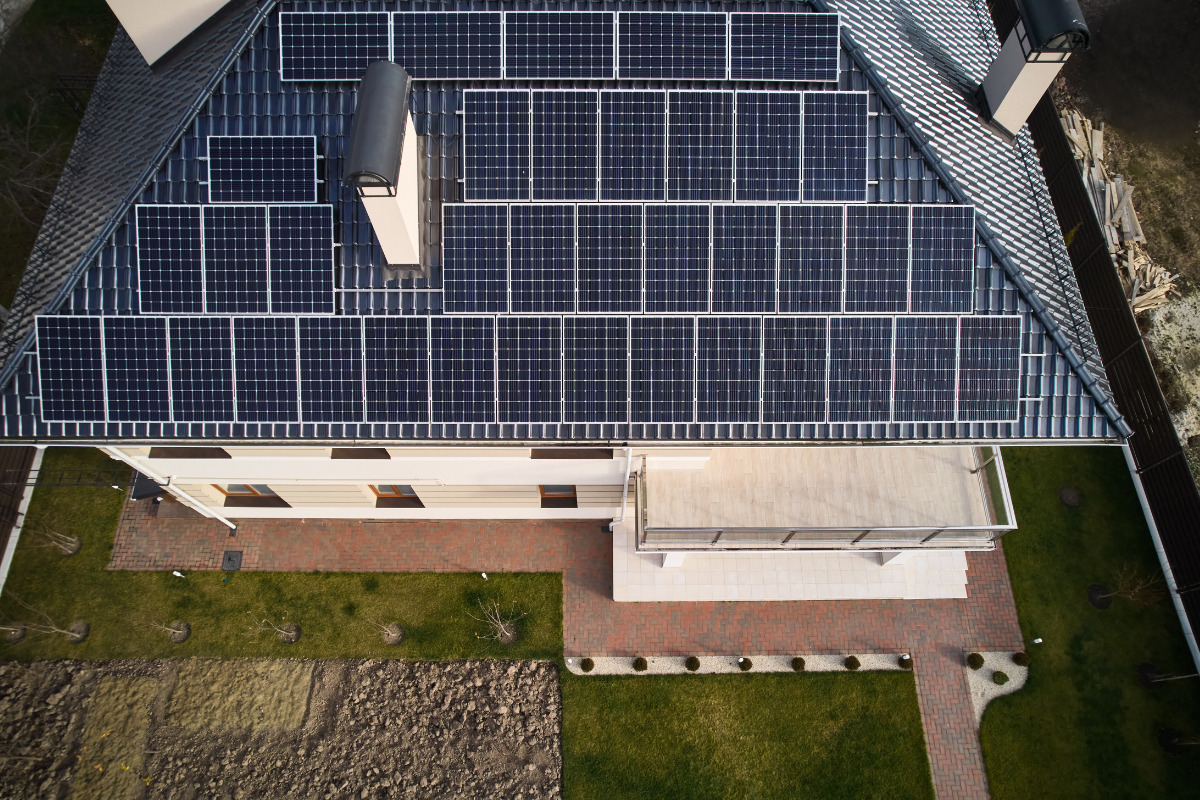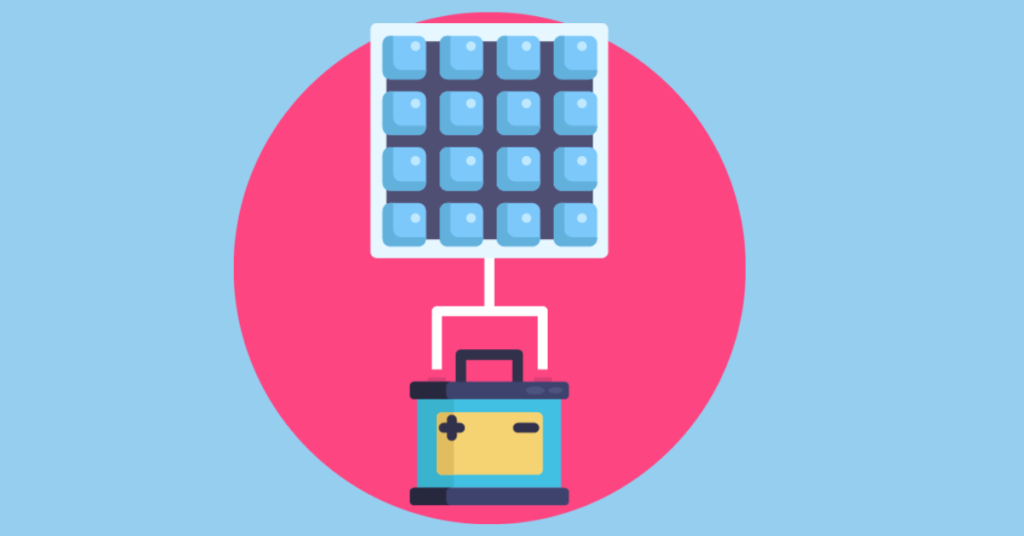Introduction
Are you considering going green and harnessing the power of solar energy for your 2000 sq ft house? Solar panels help reduce carbon footprint and save on monthly energy bills.
However, considering many factors, figuring out the required solar panels can be daunting. This blog post will guide you through estimating how many solar panels are needed for your home. This will also discuss various aspects that affect this decision.
| Key Takeaways |
|---|
| To estimate the number of solar panels needed for a 2000 sq ft house, consider factors such as monthly energy consumption, geographic location, roof orientation, shading conditions, panel efficiency, and battery storage capacity. |
| The ideal number of solar panels can vary based on these factors and may range between 16 to 21 high-efficiency solar panels for a home with an average monthly usage of around 1,000 kWh. |
| Homeowners have two main options for installation: roof-mounted or ground-mounted. Both options have advantages and disadvantages that should be considered before deciding. Hybrid systems combining solar panels with battery backups are becoming more popular too. |
| Cost considerations are essential when installing solar panels - while upfront costs can be substantial, leasing programs allow homeowners to make manageable payments while cutting down electricity bills from day one. Additionally, federal tax incentives help reduce installation costs by up to 30% |
Understanding The Number Of Solar Panels Needed For A 2000 Sq Ft House
It is important to consider factors to estimate the number of solar panels needed for a 2000 sq ft house. These factors include energy consumption, panel type, cost considerations, and geographic location.
Estimating Solar Panel Quantity
Estimating the number of solar panels needed for a 2000 sq ft house involves several key factors, including the average energy consumption of your household and the efficiency of your chosen solar panel type.
To begin with, you should calculate your home’s monthly energy usage in kilowatt-hours (kWh).
Once you have determined your monthly kWh usage, divide that by 30 to get a daily average. Then, consider the national average for sun hours per day – around 5 hours – and divide this into the daily kWh usage to determine how much power needs to be generated per hour by solar panels.
For example, if a house consumes an average of 967 kWh per month, its daily energy consumption would be roughly 32 kWh. With five sun hours daily, the solar system would need to generate about 6.4 kW per hour to cover this demand.
It’s essential to note that these estimates will vary based on factors such as geographic location, roof orientation and shading conditions at the installation site, and specific panel efficiencies.
Cost Considerations
When installing solar panels on a 2000 sq ft house, cost considerations are essential to keep in mind. While switching to solar energy is eco-friendly and can save homeowners money in the long run, the upfront installation costs can be significant.
The total cost of a solar panel system depends on various factors such as hardware components, labor fees, and any necessary permits or paperwork. Additionally, the type of solar panel chosen for installation also plays a crucial role in determining costs.
To maximize savings when installing solar panels on a 2000 sq ft house, many homeowners opt for leasing or financing programs that spread out payments over time. These programs allow homeowners to make manageable monthly payments while cutting electricity bills from day one.
Moreover, taking advantage of available federal tax incentives like The Solar Investment Tax Credit (ITC) helps reduce installation costs by up to 30%.
Dependence On Panel Type
The number of solar panels needed for a 2000 Sq Ft house also depends on the type of panel chosen. Different types of photovoltaic panels are available in the market, each with varying power output and efficiency levels.
For instance, monocrystalline solar panels have higher efficiency rates but come at a higher price than polycrystalline ones.
Understanding these differences is essential when estimating how many solar panels you’ll need for your home. By working with an experienced installer who can assess your energy consumption needs and make recommendations based on local weather conditions and incentives, you can choose the right panel type that best fits your budget and energy goals.
Factors Affecting The Number Of Solar Panels Needed
Geographic location, monthly energy consumption, roof orientation and shading, panel efficiency, and battery storage capacity are all factors that can affect the number of solar panels needed to power a 2000 sq ft house.
Geographic Location
The geographic location of a home is an important factor to consider when estimating the number of solar panels needed for a 2000 sq ft house. This is because the amount of sunlight a panel receives depends on its placement and orientation.
Homes in areas with more direct, uninterrupted sunlight will have higher energy output from solar panels compared to homes in cloudy or shaded areas. For instance, homeowners in California may require fewer panels than those living in the Pacific Northwest due to differences in weather patterns.
In addition, local incentives and regulations that vary by state can impact the cost and feasibility of installing solar systems.
Monthly Energy Consumption
Understanding your monthly energy consumption is crucial in determining the solar panels you need for a 2000-square-foot house. Energy consumption is your household’s monthly energy, measured in kilowatt-hours (kWh).
A 2000-square-foot house with an average monthly energy usage of around 1,000 kWh will require between 16 and 21 solar panels. However, if your home uses more than this monthly amount, you must install additional panels to meet those energy demands.
Monthly energy consumption monitoring helps identify areas of wastage and increase efficiency. This includes calculating solar panels required for home size and electricity usage. Additionally, simple steps like replacing old appliances or turning off lights when not in use can be taken.
Roof Orientation And Shading
The orientation and shading of a roof can significantly impact the number of solar panels needed to power a 2000-square-foot house. The ideal position for solar panels is facing south, which maximizes exposure to sunlight throughout the day.
However, if your roof doesn’t face south, you may still be able to generate enough electricity with east or west-facing panels. Shading from trees and nearby buildings should also be considered when choosing panel placement, as shaded areas produce less energy than fully exposed ones.
It’s important to consider all these factors and your home’s average monthly energy consumption when determining how many solar panels are needed for your 2000-square-foot house.
Panel Efficiency
The efficiency of solar panels is a crucial factor in determining the number of panels required to power a 2000-square-foot home. The more efficient the panel, the less will be needed to generate the same amount of electricity as less-efficient models.
For example, if you were using an older model solar panel with an efficiency rating of around 15%, you would need 24-30 panels to power your home. However, newer ultra-efficient models have efficiency ratings upwards of 20%.
This means you could get by with just 16-21 high-efficiency solar panels to generate all the energy your home needs.
By understanding how panel efficiencies affect overall system costs and performance, homeowners can choose wisely when deciding which type of PV system best suits their budget and needs without sacrificing quality or effectiveness.
Battery Storage Capacity
Battery storage capacity is essential when installing solar panels on a 2000 sq ft house. It refers to the amount of power stored in batteries at night or during cloudy days when there isn’t enough sunlight.
A larger battery bank will provide more autonomy and protection against grid outages but comes at a higher cost. Factors such as energy consumption, peak periods of usage, and local weather patterns all influence your ideal battery storage capacity.
Opting for high-quality lithium-ion batteries can increase efficiency and durability while decreasing maintenance costs over time.
Options For Solar Panel Installation For A 2000 Sq Ft House
Homeowners have two main options for solar panel installation: mounting them on the roof or in the ground.
Roof-Mounted Panels Vs. Ground-Mounted Panels
When choosing solar panels for your 2000 sq ft house, you must decide between roof-mounted panels and ground-mounted panels. Both options have their own advantages and disadvantages, which we’ll explore in the table below:
| Roof-Mounted Panels | Ground-Mounted Panels |
|---|---|
| Utilizes existing roof space, which may be more aesthetically pleasing and does not require additional land. | Allows for flexibility in positioning and orientation, which can result in higher energy production. |
| Installation is generally less expensive than ground-mounted systems, as no special foundations are required. | Installation can be more costly due to the need for foundation construction and potential landscape modifications. |
| More accessible to excellent because of air circulation, resulting in better panel efficiency (Fact 5). | Potentially less efficient due to less natural air circulation, which can affect panel efficiency. |
| It may be limited by roof size, orientation, and shading, which can impact the number of panels that can be installed (Fact 1). | It can accommodate more meetings, which can be installed in optimal locations and orientations for maximum energy production. |
| Potentially more challenging to access for maintenance and cleaning purposes. | Easier to access for maintenance and cleaning, which can help ensure optimal panel performance. |
Choosing between roof-mounted and ground-mounted panels will ultimately depend on your specific property and preferences. When deciding, consider available space, aesthetics, and overall cost.
Hybrid Solar And Storage Systems
Hybrid solar and storage systems are becoming increasingly popular as more homeowners seek to maximize their energy savings. These systems combine solar panels with a battery backup, allowing excess electricity generated during the day to be stored at night or during power outages.
One example of a hybrid system is the Tesla Powerwall, which functions as a backup power supply in case of emergencies or disruptions in grid service. With an average capacity of 13.5 kWh per unit, it can store enough energy to keep essential appliances running for several hours during an outage.
Multiple Powerwalls can be installed together for larger homes requiring more electricity.
Recommendations For Installing Solar Panels On A 2000 Sq Ft House
To ensure the successful installation of solar panels on your 2000 sq ft home, we recommend calculating the number of needed panels based on energy consumption, assessing roof and other installation considerations, choosing a reliable installation company, and understanding local regulations.
Calculating The Number Of Solar Panels Needed
Consider several factors to calculate the number of solar panels needed for a 2000 sq ft house. Here are the steps:
- Determine the average energy consumption of the house in kilowatt-hours (kWh) per month.
- Divide the monthly energy consumption by the average daily peak sunlight hours in your region to get the daily kilowatt-hour requirements.
- Multiply the daily kilowatt-hour requirements by 30 (days) to get your monthly needs.
- Choose a solar panel with an output rating that matches or exceeds your monthly requirements.
- Divide your monthly requirement by the panel’s output rating to determine how many solar panels you need.
For example, if your home uses 967 kWh per month and you live in an area with an average of 5 peak sunlight hours per day, you would need around 21-33 budget panels rated at approximately 290 watts each to meet your energy needs. Remember that other factors, such as roof orientation, shading, and panel efficiency, can all impact how many solar panels are needed for optimal energy production.
Assessing Roof And Other Installation Considerations
Another important aspect of installing solar panels on a 2000 sq ft house is assessing the roof and other installation considerations. First, the roof should be structurally sound and have enough space to accommodate the required solar panels.
The roof’s orientation and angle must also be considered to ensure maximum exposure to sunlight.
Other factors that need to be considered are local regulations and permits for solar panel installation. Some homeowners’ associations may restrict visible installations on roofs or ground-mounted systems in certain areas, so checking with them before proceeding is essential.
An experienced installer providing quality workmanship is crucial for optimal energy production and long-term cost savings.
Choosing The Right Installation Company
Choosing the right installation company is crucial to ensure your solar panel system functions optimally. Here are some things to consider:
- Look for experience: Select an installation company with a good track record of successful installation which has been in the business for a while.
- Check for licenses and certifications: Ensure the chosen company possesses all licenses and certificates required by the state or municipality.
- Read online reviews: Look for reviews from previous customers on websites such as Yelp, Angie’s List, or other consumer review sites to gauge their reputation and quality of service.
- Ask about equipment warranties: Ensure that the installation company offers a warranty on both labor and equipment to protect your investment.
- Get multiple quotes: Obtain quotes from several companies before making a final decision, comparing costs, warranties, and reputation.
- Consider local companies: Choosing a local installer can offer the advantage of personalized service and familiarity with local regulations and incentives.
Considering these factors, you can find an experienced installer who will ensure your solar panel system performs efficiently for years to come.
Understanding Local Regulations
Understanding the local regulations before installing solar panels on a 2000 sq ft house is essential. Some areas may have specific zoning laws or building codes to be followed when installing solar panels.
For instance, some locations restrict where solar panels can be placed, and others require permits before installation.
Moreover, some states offer incentives and tax credits for residential solar installations. Knowing these regulations will help you take advantage of these incentives and save money in the long run.
By researching local regulations ahead of time, homeowners can ensure a smooth and hassle-free installation process.
Conclusion
In conclusion, several factors influence the number of solar panels needed to power a 2000-square-foot house. Some key considerations include geographic location, monthly energy consumption, roof orientation and shading, panel efficiency, and battery storage capacity.
A system of 16-21 solar panels will typically suffice for an average US home of this size.
Solar incentives and financing are available in many areas. This allows more homeowners to benefit from clean energy and save costs on electricity bills. Additionally, choosing the right installation company and understanding local regulations are crucial steps that should not be overlooked.
Going solar?
If you’re considering installing solar panels for your 2,000 square feet house, it’s important to have an accurate idea of how many panels you’ll need to generate enough energy. And that’s where DroneQuote comes in!
As a trusted solar fiduciary, we specialize in providing honest feedback on all things solar, including how many panels you need for your home. By partnering with us, you can rest assured that you’ll receive reliable and professional advice backed by years of experience and expertise in the solar industry.
Don’t settle for anything less than the best – contact DroneQuote today and start your journey toward a brighter, more sustainable future!




